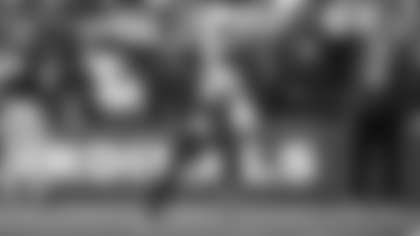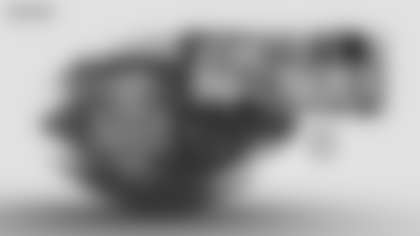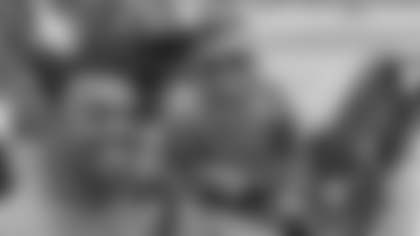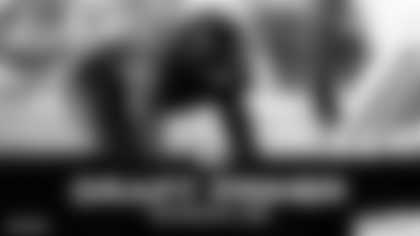Once, Patrick Peterson (wearing 7, left) and Tyrann Mathieu (14) were LSU teammates. Now Peterson (black T-shirt in right photo) is training Mathieu (shirtless right) as Mathieu tries to rehab his stalled football career.
The last time the world saw Tyrann Mathieu on a football field was in college football's ultimate finale in January 2012, in a stadium a few miles from his childhood home.
Mathieu captivated the country during the 2011 season with his quick hands, elusive speed and oversized play. As a sophomore, he led Louisiana State to the top of the polls and subsequently to a national championship bout with Alabama, a game with enough billing to fill the Louisiana Superdome five times over.
By then, Mathieu's reputation was sealed. He was a ball hawk. He took what he wanted when he wanted, forcing six fumbles in 2011 and scoring four touchdowns that season. He was even a Heisman Trophy finalist.
His ability to strip the ball was so impressive he was given the nickname, "Honey Badger."
"When you watch the tape, the ball just finds its way into his hands whether it's interceptions, fumble recoveries, punt returns," Cardinals general manager Steve Keim said. "The guy is a dynamic athlete."
Mathieu was becoming the player he set out to be: The next Patrick Peterson.
Mathieu grew up in New Orleans and attended St. Augustine High School, just a quick warm-up jog from the banks of Lake Pontchartrain. He became a household name around New Orleans, and soon that spread throughout the Southeast as the prep star garnered regional Super Dozen honors and was named an All-American.
But the offers weren't rolling in. At 5-foot-8 he was short for a cornerback and even shorter for a safety. The best schools to extend a scholarship to Mathieu were Miami (OH), SMU and Southern Mississippi. Tulane tried to keep him home.
They all lost out when Les Miles came calling. Mathieu committed to LSU in July 2009, six months before he took his official visit to Baton Rouge.
An All-American greeted Mathieu on campus that January day, the current star of LSU's secondary meeting the future. Peterson
was a few weeks removed from an All-SEC season that included a nod as a second-team All-American and he was a season away from becoming LSU's All-Everything.
None of that mattered when Peterson shook Mathieu's hand.
"Ever since that moment we just clicked like big brother and little brother," Peterson said. "We talked periodically throughout his recruiting process. Once he finally got to LSU in June (2010) we just jelled from the first day."
Mathieu knew who he was meeting. He watched Peterson tear up Death Valley in his No. 7 uniform. But, at the same time, he didn't know who he was meeting.
Peterson was quiet and laid back. His humble personality struck Mathieu. As Peterson hosted Mathieu throughout the weekend, the high school star kept noticing the same thing.
"He got along with all of his teammates," Mathieu said. "They loved and respected him for what he did on and off the field. He didn't talk a lot. He didn't preach a lot."
When Mathieu joined the Tigers in June before his freshman year, their bond strengthened. Peterson and Mathieu were together every day, watching film, talking football and becoming friends. They started working out together and it was then, under the sweltering sun in the blistering humidity of the bayou that Peterson saw glimpses of Mathieu's talent.
It was surreal for Mathieu. Ninety miles from the deep sunsets of New Orleans he found a friend and a mentor in a man he used to watch on TV. Mathieu, barely 18 years old, couldn't believe they hit off as well as they did.
"I had never been around a superstar of his caliber before," Mathieu said. "I didn't believe that he would really take me under his wing like he did. He was real humble, real honest. He would've helped anybody."
The days still blend together for Mathieu.
He can't remember if it was Thursday or Friday when he was too ashamed to scroll through his phone and find Peterson's phone number. Mathieu was arrested on Oct. 25, 2012 for possession of marijuana. As he was led away from his apartment toward a waiting police car, he watched the last chapter of his career at LSU closing.
In August 2012, Mathieu was dismissed from the team by Miles and then from school after he reportedly failed a drug test. But the Tigers' coaching staff didn't want to write Mathieu off all together. They wanted him back in 2013. After going to rehab and returning to campus as solely a student, the defensive back focused on getting his life in order. It meant going to class, working out, prepping for his return to the field at spring practice which began this month.
Then he was busted in October with three former teammates. He called his family with the news of his arrest. But he still needed to tell Peterson.
"It was extremely hard," Mathieu said. "I don't even think I called him. I texted him because I was so disappointed in myself. I knew I disappointed Patrick also.
"We had this relationship where we wanted to be the best to play at LSU. That was the hardest thing for me. I wanted to do everything at LSU that Patrick did, not to say I was better than him but to say that me and Patrick accomplished everything at LSU."
Mathieu had switched numbers to Peterson's No. 7 at LSU after Peterson left for the NFL.
!The progress in Mathieu's personal rehabilitation was surfacing. He was living alone, attending classes and staying out of trouble – at least until he was arrested. When his cell door slammed shut a few days before Halloween, so did his future as an LSU Tiger.
Peterson didn't want to harp on that. His approach mirrored his personality. Peterson was calm with Mathieu, not the hard-nosed disciplinarian that would've been expected and widely accepted. He didn't yell or lecture or preach.
"I was shocked," Peterson said. "I was a little bit disappointed at him. It's nothing we can do about it right now. It's all about trying to straighten out the situation. It's ironing out all the creases we created up to this point. It's all about getting back to where we were."
He knew how Mathieu felt. Peterson had been there before.
When Peterson was a sophomore at Ely High School in Pompano Beach, Fla., his grades dipped and his parents, Patrick Sr. and Shandra, benched him to make a point.
"They wanted to show me school was much more (important than sports)," Peterson said.
As they did with Peterson, Patrick Sr. and Shandra showed the same tough love to Mathieu. Trouble always seemed to find Mathieu in Baton Rouge, so he moved into their Pompano Beach, Fla., after his arrest. Shandra cooked for Mathieu and Patrick Sr. began coaching and mentoring him.
"My dad, he loves to coach up guys," Peterson said. "He loves to pick athlete's brains. It was pretty cool for my dad.
"It was a no-brainer to reach out his hands and help out a kid who needed help, who needed our help. We didn't want his talents to go to waste."
Second chances don't come along very often.
Peterson got one and turned it into a professional career. Mathieu's second chance is still on the clock.
A couple weeks after Peterson's season ended, Mathieu traded Florida's sun for Arizona's and joined dozens of other NFL hopefuls who were already training in the desert. But Mathieu wasn't working with a personal trainer at a high-end complex arranged by his agent. It was Peterson who invited Mathieu to stay at his house and pledged to get the former Heisman hopeful in shape for the combine.
For 14 straight days Peterson and Mathieu worked out two or three times per day at Peterson's home and at Discovery Park in Chandler.
"It wasn't no vacation for him," Peterson said. "We were really getting after it."
They focused on getting Mathieu back into football shape while Peterson taught him techniques and footwork he learned with the Cardinals.
They worked specifically on the 40-yard dash.
"That was really important," said Mathieu, who ran a 4.5-second 40-yard sprint in Indianapolis at the combine.
Peterson pushed him hard, knocking away the rust built up by not playing in a year and helping Mathieu adjust to playing with a bulkier body. Then there was the mental training. They dissected routes and coverages, getting Mathieu to think like a defensive back again.
They began retraining his mind to play every down, take it one play at a time and how to rebound from getting beat on a pass.
"I was sort of out of that mold, being around a team, practicing, going hard every day, sticking to a structured schedule," Mathieu said. "I had to get back in shape mentally."
When they weren't sweating under the winter sun, Peterson was giving Mathieu a crash course in! all things combine-related. The questions. The interviews. The media. In between sprints and drills, Peterson tried driving one point home and it had nothing to do with footwork or identifying routes. This was Mathieu's last chance.
"There's nothing more I can teach him about being a football player," Peterson said. "It's about teaching him to be a young professional.
"Just making sure he understands he has one more strike. Just being more intelligent, being a smarter man, understand the situations, understand your surroundings around you, just being on top of your game that much more than you were prior to your situation, meaning getting kicked off the football team."
That second chance, that last strike, began in a blustery Indianapolis.
Mathieu went into the combine hat in hand, handling the barrage of questions about his drug use with humility and honesty. He talked about going to rehab, having a sponsor, attending counseling. He described hitting rock bottom.
"A lot of things that I put before football really aren't fun anymore without football," Mathieu told the media throng. "Once I get football back in (my) life I'm going to approach it a little bit different and it'll hopefully have a better outcome."
Cardinals special teams coordinator Amos Jones, who scouted Mathieu at LSU's pro day a couple years ago, compares Mathieu's situation to a redshirt year. The same questions asked of a college freshman can be applied to Mathieu.
"Were they developed? Do they get still in the weight room? Do they lose the conditioning aspect of it? What phase of their game doesn't develop because of the year of not being in football?" Jones said. "Football is such a different game. You have to do football on a continuous basis."
The last time Mathieu had any semblance of an organized football life was August 2012, before he was kicked off the Tigers after reportedly failing a drug test. But that doesn't matter to Peterson. Football is like riding a bike, like walking, Peterson said. All Mathieu has to do is lace up his cleats, strap on the pads and step onto a field.
"You never forget how to talk. You've been doing this for Lord knows how long," Peterson said. "It'd be very difficult to forget route recognition or route combinations."
It hasn't been difficult for Peterson to believe in Mathieu.
He believes Mathieu's learned from his past and can chase down an NFL career like he did a receiver as a ball-hawking back at LSU. He sees Mathieu as a special teamer or a defensive back, possibly fitting into the Cardinals' system as a bonus player in the dime or nickel packages. Maybe Mathieu could line up across the field from Peterson. Or return kicks.
Wherever Mathieu ends up, Peterson will keep believing. There's a reason he hasn't stopped yet.
"Just these last six months he's just been a big brother," Mathieu said. "He's really been a teacher for me.
"I think I'd still be trying to play in the NFL but I think it'd be a tougher road without having that guy at LSU. Even right now, it would've been a tougher road without Patrick."














